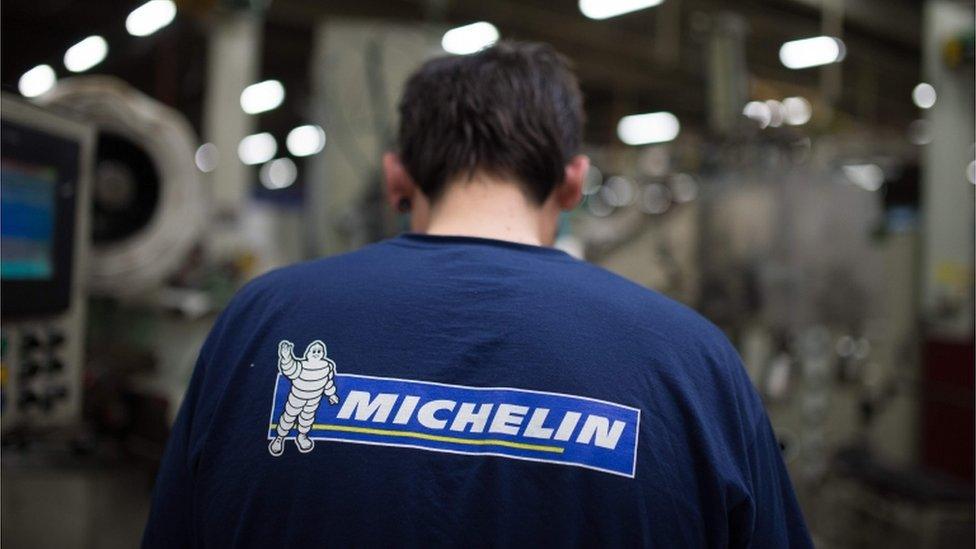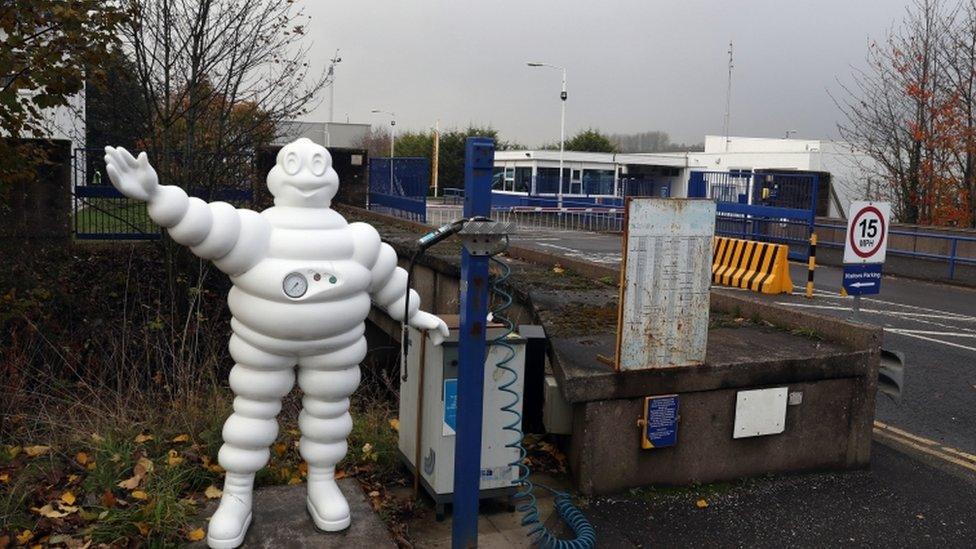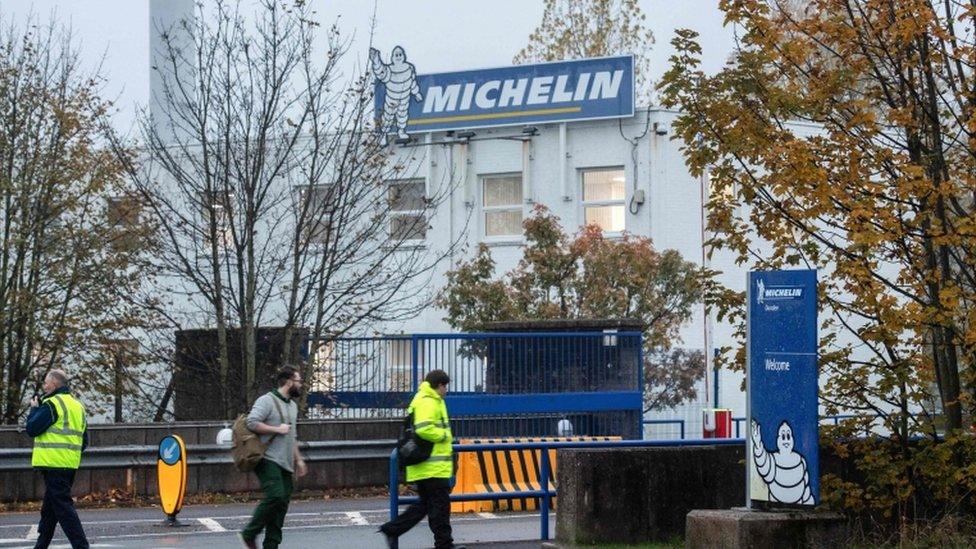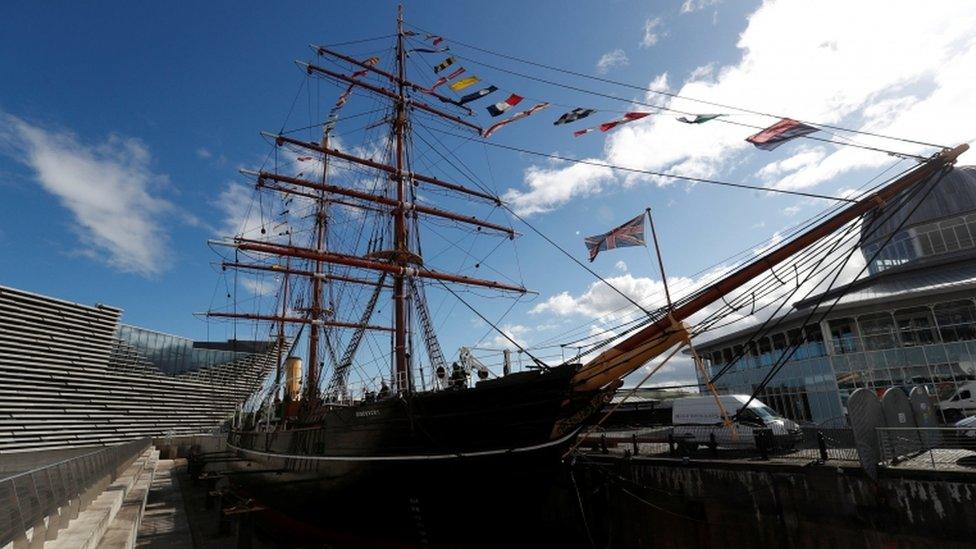Michelin closure: A dark day in Dundee
- Published

There is a Dundee song which opens with a list; a litany of major textile employers in the city. Frequently sung in a mournful voice, it goes through the names.
Cox's, Halley's, Eagle, Craigie, Brochie's, Baxter's, Bowbrig, Cairds.
These were all significant factories, large-scale employers. The Caird Hall in the city derives its name from the last on the list. Cox's huge chimney stack still stands, smokeless, in Lochee.
The names set out have one other thing in common. Each and every one has closed, along with the other mills which once dominated Juteopolis.
The song tells of a worker's concerns. She notes that she is "gettin' tired o' workin'". However, she adds plaintively: "But tae lose my job I'm feared."
That same sense of fear has today turned into brutal reality for 845 workers at Michelin in Dundee. The plant, long linked with innovation, is now scheduled for closure by 2020.
And the list above? I offer it to help explain the deep sense of weariness and gloom which will envelop the city as a consequence of the latest news.
For there is a back-story, a context. In recent and past decades, Dundee has had to become inured to endless industrial closures. Factory after factory. Site after site.
Some went quietly, slipping into oblivion. Some were accompanied by turmoil, like the Timex factory which closed in 1993 after a bitter industrial dispute.
Even when it appeared that the downward trend might be reversed, there were setbacks. In 1988, the Ford Motor Company intended to open an electronics plant in Dundee. Unions squabbled over recognition at the factory. The jobs went to Spain.
And now this. And now, say my fellow Dundonians, this. Just when it seemed the city had finally turned a corner. Just when the opening of the V&A offered hope.

First things first. From historical context to contemporary dismay. Our thoughts must be with the workforce who have, by all accounts, adapted and reformed in co-operation with the management in order to make the plant succeed.
One could not but help feel empathy for Bob MacGregor, the Unite regional organiser, when he offered his analysis on the wireless this morning.
His contribution was a blend of sadness, anger and bewilderment - but also quiet determination that every possible solution would now be pursued to preserve the plant and the jobs.
Ditto Shona Robison who noted that the Scottish and UK governments stood ready to help, in the event that a credible rescue strategy could be devised. Derek Mackay, the cabinet secretary, is in the factory as I write, having already held preliminary talks previously with the parent company in France.
One can but hope that these efforts will be successful. The problem, as all recognise, is that the market for the particular tyres produced in Dundee has shrunk and been usurped by lower-cost competition from Asia.
Michelin management talk supportively of trying to find alternative employment for their workers. But that, of course, would still involve a diminution in Dundee's industrial base, a shrinking of the city's economy.
Hence the desire to maintain the plant in some form. To mitigate that shrinkage. So that is one front. A resolve to reverse the announced closure. A concerted attempt to win a reprieve.
However, there is another, broader consideration. The Michelin workers in Dundee will, entirely understandably, want to hear about direct action to save their jobs. That is to be acknowledged, respected and pursued.
More generally, though, this latest gloomy news on the industrial front should lead Dundee - and Scotland - to consider once more the strategic direction for our economy.

The stated Purpose (with a capital P) of the Scottish government is sustainable, economic growth. But how is that to be achieved?
Over the weekend, I chanced to visit the wonderful Riverside Museum in Glasgow. The glorious models of ships constructed on the Clyde, floating by in a deftly assembled line. The massive locomotives. The historic automobiles, innovative in their day.
I studied the rubric attached to several of the ship displays. They reminded me, again, that the Clyde flourished because Scottish engineers devised methods which made their ships faster, more reliable and thus more globally attractive.
Ditto textiles in Dundee. Jute first happened because deft entrepreneurs took a raw product and softened it with whale oil from the city's Arctic fleet.
As these indigenous industries declined, Scotland turned partly to foreign direct investment on new sites. In Dundee, it was, eventually, the triumvirate of Michelin, Timex and NCR, known locally as the Cash. NCR remains in much diminished form but with vital employment in R&D.
However, to emphasise, classic manufacturing has declined across Scotland and the UK as a whole, with the advent of low-cost competition in global markets.

The revitalisation of Dundee's waterfront had prompted a rush of positivity about the city's prospects
The issue now is how to address that. How to sharpen productivity and enhance competitiveness. I stress, for the avoidance of any doubt, that these are issues for Scotland collectively, not targeted at Michelin where the Dundee factory has a high reputation.
Scotland, again generally, must perhaps seek to retain as much manufacturing capacity as possible, probably at the high end - while building upon science, the service sector, excellence in higher education and other opportunities; digital, creative.
Whatever happens to Michelin - and one profoundly hopes it is positive - such must be the strategy for Dundee too.
Brian Cox, who began his stellar acting career in his native Dundee, said today that his home town should now be known as the "city of survival", alongside its more common tag, "City of Discovery". The former Dundee University rector discerned a determination, a resilience, in his fellow Dundonians. In truth, they have had all too many reasons to develop such characteristics.
I hope that Brian is right. I hope - and believe - that the ancient and proud city of my birth will, once again, fight back. I hope the spirit of ambition, the evident verve which has been recreated in Dundee can be sustained.
Perhaps one day a future Michelin Guide to Dundee will track the city's determination to survive and thrive, despite industrial setbacks. Perhaps a Dundee restaurant will, in future, gain a coveted Michelin star.
But not today, friends. Not today.
- Published6 November 2018
